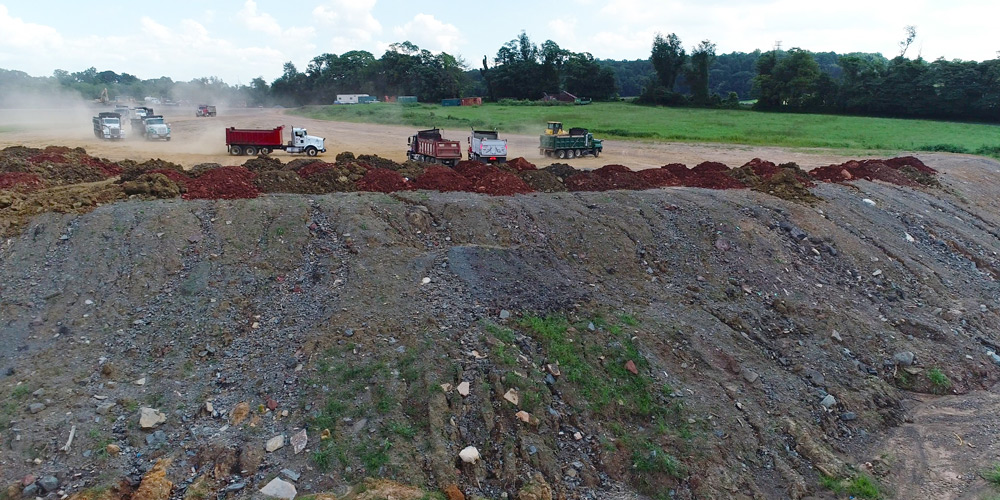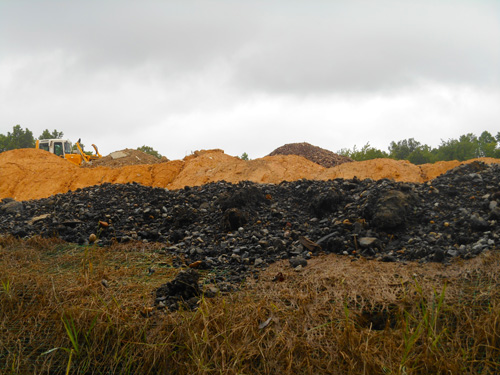
This is an 18-acre site near Hamilton that has been scrutinized and documented by the folks at LoudounRuralLandfills.com. They estimated that the owner took 28,000 truckloads and potentially received payment of $11.8 million accepting the dirt and rubble. Learn more about legislation in front of the 2020 Virginia General Assembly to address this issue.
Steve and Jennifer Rainwater have lived on a 5.2-acre farm on Brent Town Road in Fauquier County for 14 years, where they care for two rescue draft horses. Jennifer described the home she bought in December 2005 as “beautiful and quiet.” She described a house surrounded by woodland, barbecuing on the back patio, and her kids camping down by the pond. “This place was our haven,” she explained.
However, their world was turned upside down in 2017 when an access road was built along their property line and hundreds of dump trucks started arriving to dump dirt, non-stop, on a section of the property, behind their house. The new access road created runoff and flooding problems that damaged their pastures and a small pond that had provided fresh water for the horses. Although silt fences were used in places, they regularly collapsed and were generally ineffective. The view from their second floor has changed from woods to a never-ending construction site.
“They’ve taken away everything I bought the property for. I would move tomorrow if I could.”
Steve and Jennifer showed me a short video of dozens of dump trucks lined up on the road behind their house, and explained that there were as many as 349 trucks on a single day. At its peak, Jennifer described coming home to her horses and house covered in dust from the constant stream of trucks. “They’ve taken away everything I bought the property for. I would move tomorrow if I could,” Jennifer said. They’ve taken a $170,000 loss on their home according to their most recent appraisal. Even though the dumping directly behind their house has slowed down and moved to another part of the property, the stream beds have permanently dried up, the land behind their house remains barren, and they worry about the safety of their well water into the future.
This is sadly not a unique case. As road projects and development have picked up in other areas of the state, the need to find locations to cost-effectively dispose of dirt has also increased. Many rural landowners have found that they can make significant money by accepting large quantities of dirt and rubble on their land. Dumpsites similar to the one located behind the Rainwaters’ property are scattered throughout Fauquier, Prince William, and Loudoun. Neighbors of a site near Hamilton in Loudoun even produced a video of the activity and its impacts on neighbors (you can see the video at loudounrurallandfills.com).

The impact of tons of dirt being disposed of on agricultural fields and hundreds of dump trucks traveling on rural roads is severe. Neighbors have had to deal with dust, noise, runoff of mud onto their properties, and sediment in streams. Public roads have been impacted by excessive dirt on the roads leading to slick conditions, damage due to excessive use by overweight vehicles, and increased traffic. There is also a lingering fear of groundwater contamination because much of this soil is coming from road projects and infill development in urban settings and no one is monitoring the soils and rubble for common contaminants like lead, petroleum, asbestos, and chromated copper arsenate.
Although there is a web of regulation that plays a role in the oversight of these activities, there is nothing that clearly controls the scale of dumping that residents are dealing with. In our state code, there are regulations regarding stormwater management, erosion and sediment control, solid waste management, and wetlands protection. However, there are exemptions for “agricultural engineering operations” and the disposal of soil and “uncontaminated” rubble (concrete, asphalt, brick, etc.) in a “beneficial” manner. The Virginia Department of Environmental Quality (DEQ) references these exemptions, along with the fact that they have delegated stormwater management and erosion and sediment control responsibilities to local governments, as their reasons for not regulating these activities.
Creating 10 to 20-foot plateaus of dirt and rubble, bringing in hundreds of dump trucks a day, and running the operation for years is not agriculture.
A couple of local governments, like Prince William and Fauquier, have attempted to pass zoning requirements limiting the amount of dirt that can be brought in and how it can be used. Some have also required stormwater management and/or erosion and sediment controls. However, contractors and landowners have found that enforcement is very weak and that localities are hesitant to challenge claims that they are exempt from regulations and zoning because they are actively farming part of the parcel or are preparing the land for future agricultural use.
So what’s the solution? A public call for change. Creating 10 to 20-foot plateaus of dirt and rubble, bringing in hundreds of dump trucks a day, and running the operation for years is not agriculture. People should tell their state elected officials that these unregulated dumpsites in rural areas are not acceptable and legislative changes are needed the tighten up exemptions and loopholes that are being exploited. With state support, localities will be better equipped to draft and enforce local ordinances that challenge absurd claims that these operations are agricultural practices.
If this issue is something you are experiencing yourself or something you would like to learn more about, please reach out to PEC field representative Julie Bolthouse at jbolthouse@pecva.org or 540-347-2334 x. 7042.
UPDATE: During the 2020 Virginia General Assembly Session, HB 1310 (Webert R-18) and HB 1639 (Guzman D-31), were introduced (and passed!) to help address the dumping of excavation fill dirt from construction sites on rural lands.
